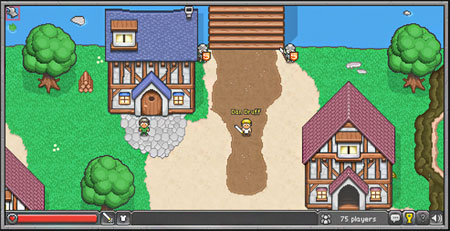Mozilla's "Browser Quest" online game may look crude by cutting-edge, hardcore gaming standards, but it's intended as a simple showcase for how technologies like HTML5 can be used to create cross-platform games and apps. The growing sophistication of HTML5 could spell trouble for Adobe Flash.
 "BrowserQuest is a showcase of how open Web technologies like HTML5, JavaScript, CSS (cascading style sheets) and WebSockets can be used to create a multiplayer game that scales up to thousands of users," Christian Heilmann, principal developer evangelist at Mozilla, told TechNewsWorld.
"BrowserQuest is a showcase of how open Web technologies like HTML5, JavaScript, CSS (cascading style sheets) and WebSockets can be used to create a multiplayer game that scales up to thousands of users," Christian Heilmann, principal developer evangelist at Mozilla, told TechNewsWorld.
"Its main purpose is to prove that the Web is a platform for gaming as much as it is a platform for apps and documents," Heilmann continued. "It also shows that JavaScript can be used server-side with node.js to allow for scalable architectures without resorting to non-Web technologies and plugins."
Node.js is a platform built on Chrome's JavaScript runtime for building fast, scalable network applications. It uses an event-driven, non-blocking input/out model that makes it both lightweight and efficient. This is suitable for running data-intensive real-time applications running across distributed devices such as MMO games.
Audio is one of the weakest parts of HTML5, Ward pointed out. "Some of the HTML5 applications out there still use the Flash Player plugin behind the scenes to handle the audio because the audio pieces of HTML5 aren't robust enough to really do quality audio," he added.
However, HTML5 may continue to gain ground as a development platform in the wake of Adobe's (Nasdaq: ADBE) introduction of new premium features for Flash Player that developers and publishers will have to pay for if their net revenues from the games, minus taxes and fees, add up to more than $50,000.
That's for the lifetime of the game, Adobe spokesperson Alex Dewey told TechNewsWorld.
Having to pay may prove unpopular among many game makers.
"Adobe has a strong position, and there's a large market for Flash-based applications, but without more effective strategies to gain ground on alternatives such as HTML5, the future for Flash and the premium player strategy is not terribly bright," Eric Leland, a partner at FivePaths, told TechNewsWorld.
is not terribly bright," Eric Leland, a partner at FivePaths, told TechNewsWorld.
"We honestly cannot see a model whereby developers are consciously choosing a pay model when they have perfectly viable tools like HTML5," Mike Ricci, vice president of Webtrends' digital solutions group, told TechNewsWorld. "This seems like more of a matter of putting a thumb in the large hole that has sprung in the Adobe dike and trying to salvage some of the games developers who have continued to use Flash."
The Mozilla Foundation on Wednesday released BrowserQuest, a massively multiplayer online (MMO) game written in HTML5, JavaScript and other open source languages. [*Correction - March 29, 2012]

"BrowserQuest"
"Its main purpose is to prove that the Web is a platform for gaming as much as it is a platform for apps and documents," Heilmann continued. "It also shows that JavaScript can be used server-side with node.js to allow for scalable architectures without resorting to non-Web technologies and plugins."
Node.js is a platform built on Chrome's JavaScript runtime for building fast, scalable network applications. It uses an event-driven, non-blocking input/out model that makes it both lightweight and efficient. This is suitable for running data-intensive real-time applications running across distributed devices such as MMO games.
HTML5 vs Adobe Flash
"It will take time for HTML5 to improve in many aspects," Lewis Ward, a research manager at IDC, told TechNewsWorld.Audio is one of the weakest parts of HTML5, Ward pointed out. "Some of the HTML5 applications out there still use the Flash Player plugin behind the scenes to handle the audio because the audio pieces of HTML5 aren't robust enough to really do quality audio," he added.
However, HTML5 may continue to gain ground as a development platform in the wake of Adobe's (Nasdaq: ADBE) introduction of new premium features for Flash Player that developers and publishers will have to pay for if their net revenues from the games, minus taxes and fees, add up to more than $50,000.
That's for the lifetime of the game, Adobe spokesperson Alex Dewey told TechNewsWorld.
Having to pay may prove unpopular among many game makers.
"Adobe has a strong position, and there's a large market for Flash-based applications, but without more effective strategies to gain ground on alternatives such as HTML5, the future for Flash and the premium player strategy
"We honestly cannot see a model whereby developers are consciously choosing a pay model when they have perfectly viable tools like HTML5," Mike Ricci, vice president of Webtrends' digital solutions group, told TechNewsWorld. "This seems like more of a matter of putting a thumb in the large hole that has sprung in the Adobe dike and trying to salvage some of the games developers who have continued to use Flash."










No comments:
Post a Comment